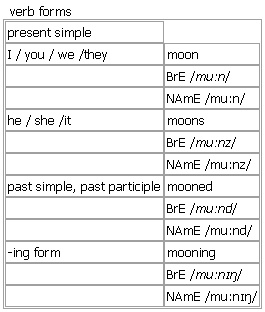 moon
moon

moon [moon moons mooned mooning] noun, verb BrE [muːn] NAmE [muːn]
noun
1. (usually the moon), (also the Moon)singular the round object that moves around the earth once every 27½ days and shines at night by light reflected from the sun
•the surface of the moon
•a moon landing
2. singular the moon as it appears in the sky at a particular time
•a crescent moon
• There's no moon tonight (= no moon can be seen).
• By the light of the moon I could just make out shapes and outlines.
see also ↑full moon, ↑half-moon, ↑new moon
3. countable a natural ↑satellite that moves around a planet other than the earth
•How many moons does Jupiter have?
more at once in a blue moon at ↑once adv., promise sb the earth/moon/world at ↑promise v.
Word Origin:
Old English mōna, of Germanic origin; related to Dutch maan and German Mond, also to ↑month, from an Indo-European root shared by Latin mensis and Greek mēn ‘month’, and also Latin metiri ‘to measure’ (the moon being used to measure time).
Example Bank:
•A large black cloud covered the moon.
•During the eclipse, the moon passed between the sun and the Earth.
•Galileo discovered the moons of Jupiter.
•Saturn's icy moons
•The agency wants to establish a permanent moon base.
•The calendar gives you sunset times as well as moon phases.
•The full moon hung high in the night sky.
•The moon cast its soft glow on the earth below.
•The moon had almost set and the night was now dark.
•The moon reflected perfectly off the surface of the water.
•The road shone frostily under the full moon.
•They had to work by the light of the moon.
•an astronaut who was killed during the first moon mission
•the first man to walk on the moon
Idioms: ask/cry for the moon ▪ ↑many moons ago ▪ ↑over the moon
Derived: ↑moon about ▪ ↑moon over somebody
verb intransitive (informal)
to show your bottom to people in a public place as a joke or an insult
Verb forms: 
Word Origin:
Old English mōna, of Germanic origin; related to Dutch maan and German Mond, also to ↑month, from an Indo-European root shared by Latin mensis and Greek mēn ‘month’, and also Latin metiri ‘to measure’ (the moon being used to measure time).
|
|
